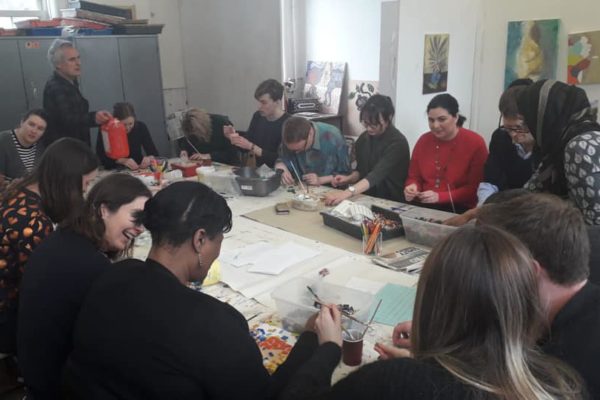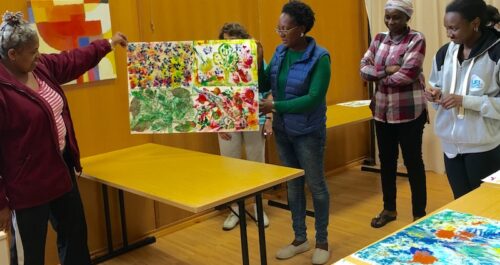
What do East-London based artists think about Social Action Projects (SAPs)? Are they already delivering them? Do they use structured learning outcomes in the process? Is it even useful to use terms like these?
Rosetta Arts asked these questions and more as part of a series of interviews with artists and arts leaders in November 2021, forming part of the UK research for an Erasmus+ project called Motivate 2 Create (M2C).
As a deeply-rooted community arts charity working closely with local artists and communities, it was a straightforward task for us to find the right people to ask. Having spread the word among our regulars and reached out to wider networks through digital promotion, the participants we interviewed included CEOs, creative consultants, and socially engaged artists working across illustration, photography, painting, documentary and more. These professionals deliver programmes around LGBTQ+ issues, and for refugees, young people and women from minority backgrounds.
We found that our interviewees didn’t really use the term ‘SAP’ but that many of them were delivering something similar in the socially engaged projects they were leading to tackle important local issues such loneliness, inequality or poverty.
As a lot of our artists are also educators, most of them were already employing structured learning outcomes in their projects but not in a standardised way (and some had a ‘take it or leave it’ approach). Adult education teachers were most likely to clearly define hard skills in their structured learning outcomes whereas artists-only were aware of softer outcomes.
Almost everyone saw SAPs as highly relevant for the need of the local context and welcomed the idea of particular resources that they could use to help them structure outcomes and deliver SAPs, with many kinds of ideas detailed from toolkits, to mentoring, zoom workshops, step by step guides and short videos.
And what makes a good SAP? There were certain trends that stood out repeatedly: listening and c0-designing projects with communities was a priority. Allowing communities to be empowered and feel heard. Not assuming anything, like what they are interested in and how educated they are. A good SAP facilitator has good emotional intelligence and a strong understanding of the local context. Organisation skills, fundraising skills and especially networking skills were emphasised – it was repeatedly stressed that you need to know lots of residents, local organisations, partners and funders to deliver SAPS.
So what’s next? After this we will get together with the other project partners and create resources to equip community education workers and community artists with the innovative methods and tools they need to develop their knowledge and capability to support communities social action project-based learning in the future. Watch this space.
For more information, visit: https://www.motivatetocreate.eu/
The #motivate2createEU project is co-financed by the ERASMUS+ programme of the European Union, and will be implemented from June 2021 to May 2023. The project content reflects the views of the authors, and the European Commission cannot be held responsible for any use which may be made of the information contained therein.
#motivate2createEU


